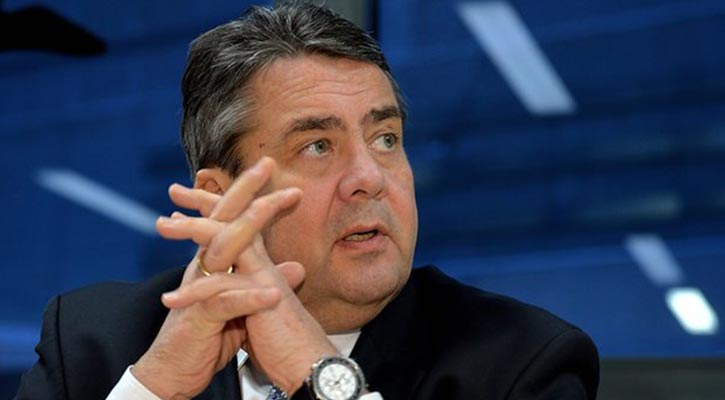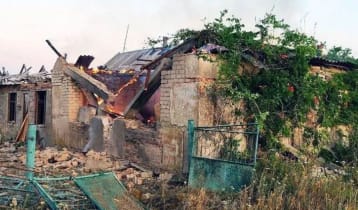Germany hits back at Trump criticism of refugee policy
3 || risingbd.com

Photo taken from Internet
International Desk: Berlin has mounted a staunch defence of its policies after Donald Trump criticised the German chancellor, Angela Merkel, for her stance during the refugee crisis and threatened a 35% tariff on BMW cars imported into the US.
Germany’s deputy chancellor and minister for the economy, Sigmar Gabriel, said on Monday morning that a tax on German imports would lead to a “bad awakening” among US carmakers since they were reliant on transatlantic supply chains.
“I believe BMW’s biggest factory is already in the US, in Spartanburg [South Carolina],” Gabriel, leader of the centre-left Social Democratic party, told the Bild newspaper in a video interview.
“The US car industry would have a bad awakening if all the supply parts that aren’t being built in the US were to suddenly come with a 35% tariff. I believe it would make the US car industry weaker, worse and above all more expensive. I would wait and see what the Congress has to say about that, which is mostly full of people who want the opposite of Trump.”
In an interview with Bild and the Times, the US president-elect had indicated that he would aim to realign the “out of balance” car trade between Germany and the US. “If you go down Fifth Avenue everyone has a Mercedes Benz in front of his house, isn’t that the case?” he said. “How many Chevrolets do you see in Germany? Not very many, maybe none at all … it’s a one-way street.”
Asked what Trump could do to make sure German customers bought more American cars, Gabriel said: “Build better cars.”
Shares in carmakers BMW, Daimler and Volkswagen fell on Monday morning following Trump’s comments. BMW shares were down 0.85%, shares in Daimler were 1.54% lower and Volkswagen shares were trading 1.07% down in early trading in Frankfurt.
All three carmakers have invested heavily in factories in Mexico, where production costs are lower than the US, with an eye to exporting smaller vehicles to the American market.
A BMW spokeswoman said a BMW Group plant in the central Mexican city of San Luis Potosi would build the BMW 3 Series starting from 2019, with the output intended for the world market. The plant in Mexico would be an addition to existing 3 Series production facilities in Germany and China.
Responding to Trump’s comments that Merkel had made an “utterly catastrophic mistake by letting all these illegals into the country”, Gabriel said the increase in the number of people fleeing the Middle East to seek asylum in Europe had partially been a result of US-led wars destabilising the region.
“There is a link between America’s flawed interventionist policy, especially the Iraq war, and the refugee crisis, that’s why my advice would be that we shouldn’t tell each other what we have done right or wrong, but that we look into establishing peace in that region and do everything to make sure people can find a home there again,” Gabriel said.
“In that area Germany and Europe are already making enormous achievements – and that’s why I also thought it wasn’t right to talk about defence spending, where Mr Trump says we are spending too little to finance Nato. We are making gigantic financial contributions to refugee shelters in the region, and these are also the results of US interventionist policy.”
Trump’s remarks on Nato were met more favourably in Moscow, where Dmitry Peskov, spokesman for the Russian president, Vladimir Putin, agreed with the US president-elect that the alliance was “obsolete”.
“Since Nato is tailored toward confrontation, all its structures are dedicated to the ideals of confrontation, you can’t really call it a modern organisation meeting the ideas of stability, steady growth and security,” he said.
But Trump’s suggestion that the US could lift its sanctions on Russia in exchange for an agreement to reduce the countries’ nuclear arsenals elicited a cooler response.
Peskov said Russia had not been conducting talks with the US about nuclear arsenal reduction and said cancelling sanctions was not a political goal in Russia.
“Russia wasn’t the initiator in introducing these restrictions, and Russia, as the president of Russia has underlined, doesn’t intend to raise the issue of these sanctions in its foreign contacts,” he said.
Last month, Putin said Russia needed to strengthen its strategic nuclear forces. Leonid Slutsky, a Russian MP, said he “wouldn’t connect these two issues and make the cancellation of sanctions a negotiating point in such a delicate area as nuclear security”.
Konstantin Kosachyov, head of the foreign affairs committee in the Russian senate, said the cancellation of sanctions was “definitely not an end in and of itself for Russia”.
Russia dossier: what happens next – and could Donald Trump be impeached?
Read more
“It’s not even a strategic goal for which something needs to be sacrificed, especially in the security sphere,” he told state news agency RIA Novosti. “We think [sanctions] are a bad legacy of the departing White House team that need to be sent after it into history.”
Following Trump’s election victory in November, Merkel had offered the president-elect close cooperation on the basis of the shared values of “democracy, freedom, and respect for the law and the dignity of man, independent of origin, skin colour, religion, gender, sexual orientation, or political views”.
Gabriel, who is expected to run as the centre-left candidate against Merkel in Germany’s federal elections in September, said Trump’s election should encourage Europeans to stand up for themselves.
Source: agencies
risingbd/Dhaka/Jan 16, 2017/Nasim
risingbd.com



















